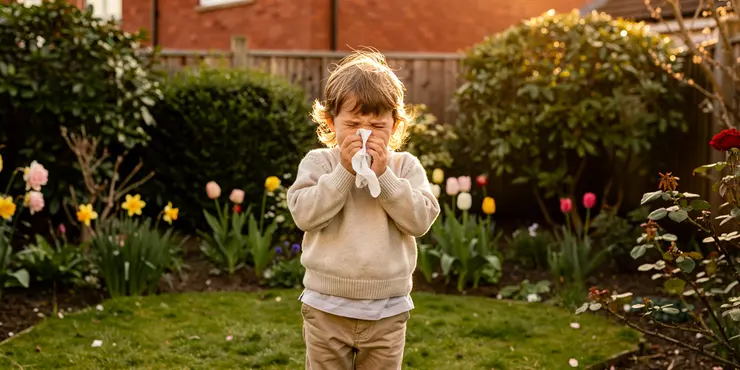
Find Help
More Items From Ergsy search
-

What are the common symptoms of hay fever?
Relevance: 100%
-

Can diet influence hay fever symptoms?
Relevance: 95%
-

What is hay fever?
Relevance: 93%
-

Can hay fever symptoms mimic other conditions?
Relevance: 93%
-

Hay fever advice | NHS
Relevance: 88%
-

Can hay fever be prevented?
Relevance: 88%
-

Do masks help with hay fever?
Relevance: 87%
-

Is there a link between hay fever and asthma?
Relevance: 86%
-

Can children develop hay fever?
Relevance: 86%
-

Can hay fever occur year-round?
Relevance: 85%
-

Are some people more prone to hay fever?
Relevance: 84%
-

Do pets contribute to hay fever?
Relevance: 83%
-

Can mosquito screens help reduce hay fever symptoms?
Relevance: 82%
-

Is hay fever more common in urban areas?
Relevance: 82%
-

Antihistamines how they work with hay fever
Relevance: 82%
-

How does pollen affect people with hay fever?
Relevance: 81%
-

Do all plants produce pollen that causes hay fever?
Relevance: 81%
-

Self care - hay fever itchy eyes
Relevance: 80%
-

Why are experts warning of rising hay fever cases?
Relevance: 79%
-

Experts Warn of Rising Hay Fever Cases as Pollen Counts Surge
Relevance: 76%
-

Are there any treatments for hay fever?
Relevance: 62%
-

How long does a typical hay fever season last?
Relevance: 54%
-

How to treat glandular fever | NHS
Relevance: 39%
-

Caring for a child with fever | NHS
Relevance: 38%
-

Can dengue fever be contracted in the UK?
Relevance: 36%
-

Is there a risk of yellow fever being spread by mosquitoes in the UK?
Relevance: 36%
-

Which medication should be avoided for children with fevers?
Relevance: 36%
-

What are the symptoms of flu ?
Relevance: 34%
-

What are the symptoms of measles?
Relevance: 33%
-

What are the symptoms of Rubella?
Relevance: 33%
-

What are the symptoms of measles?
Relevance: 33%
-

What are the common symptoms of a cold?
Relevance: 33%
-

What are the symptoms of chickenpox?
Relevance: 32%
-

What are the symptoms of measles?
Relevance: 32%
-

What are the symptoms of Zika virus?
Relevance: 32%
-

What are common symptoms of meningitis?
Relevance: 32%
-

Can lifestyle changes help manage pain and fever during pregnancy?
Relevance: 31%
-

What is Dengue Fever?
Relevance: 31%
-

What are the symptoms of norovirus?
Relevance: 31%
-

What are the symptoms of H3N2 flu?
Relevance: 31%
Can Hay Fever Symptoms Mimic Other Conditions?
Hay fever, also known as allergic rhinitis, is a common condition in the UK, particularly during the spring and summer months when pollen levels are high. It is characterized by symptoms such as sneezing, a runny or blocked nose, itchy eyes, and a scratchy throat. While these symptoms are well-known, they can often be mistaken for those of other conditions, potentially leading to misdiagnosis and inappropriate treatment.
Common Symptoms of Hay Fever
The primary symptoms of hay fever include frequent sneezing, a congested or runny nose, itchy and watery eyes, and an itchy throat, ears, or mouth. Some people also experience fatigue, headaches, and difficulty concentrating. These symptoms arise when the body's immune system overreacts to airborne pollen, releasing histamine and other chemicals that cause these allergic reactions.
Conditions That May Resemble Hay Fever
Several conditions share similar symptoms with hay fever, making it challenging to distinguish between them based solely on symptom presentation. One such condition is the common cold. Like hay fever, a cold can cause a runny nose, sneezing, and fatigue. However, colds are usually accompanied by other symptoms such as a cough and sometimes fever, which are not typical of hay fever.
Another condition that can mimic hay fever is sinusitis, an inflammation of the sinuses. Symptoms of sinusitis include nasal congestion, pressure around the eyes and forehead, and a thick nasal discharge, which can be confused with hay fever. However, sinusitis often develops after a cold or an infection and lasts longer than hay fever symptoms, which are typically seasonal.
Distinguishing Hay Fever from Other Conditions
Distinguishing hay fever from other conditions begins with understanding the timing and duration of symptoms. Hay fever symptoms are usually seasonal, appearing in the spring, summer, or early autumn when pollen levels are elevated. In contrast, colds and sinusitis can occur at any time of the year.
Another distinguishing feature is the presence of itchy eyes and throat, which are more specific to hay fever and not as common with colds or sinusitis. Additionally, individuals with hay fever often have a history of allergic reactions or other allergies, such as asthma or eczema, providing a helpful context for diagnosis.
Seeking Appropriate Treatment
If you suspect that you or someone else is experiencing symptoms that could be hay fever, a visit to a healthcare professional can provide clarity. Medical professionals might conduct allergy tests to confirm hay fever. Antihistamines, decongestants, and nasal corticosteroids are commonly used to treat hay fever symptoms. However, identifying the correct condition is crucial to ensure proper treatment, as treatments effective for hay fever might not be suitable for conditions like sinusitis or the common cold.
Being informed about the similarities and differences between these conditions can help in seeking timely and effective treatment, ultimately improving quality of life during peak allergy seasons. Knowing when it's more than just hay fever can prevent prolonged discomfort and aid in accessing appropriate medical support.
Can Hay Fever Symptoms Look Like Other Illnesses?
Hay fever, or allergic rhinitis, is common in the UK. It happens mostly in spring and summer when there's a lot of pollen. Hay fever makes people sneeze, have a runny or blocked nose, itchy eyes, and a scratchy throat. Sometimes, these symptoms look the same as other illnesses. This can make it hard to know what the problem is and can lead to wrong treatments.
What Hay Fever Feels Like
When you have hay fever, you might sneeze a lot, have a runny or blocked nose, feel itchy in your eyes, and have an itchy throat, ears, or mouth. Some people also feel very tired, have headaches, and find it hard to concentrate. This happens because your body thinks pollen is bad and tries to fight it, which causes these reactions.
Other Illnesses That Feel Like Hay Fever
Some illnesses can feel like hay fever, making it hard to tell them apart just by the symptoms. One is the common cold. Like hay fever, a cold causes a runny nose, sneezing, and feeling tired. But colds often come with a cough and sometimes a fever, which are not usual for hay fever.
Sinusitis can also seem like hay fever. Sinusitis is when your sinuses are swollen. It can cause a stuffy nose, pressure around the eyes and forehead, and thick snot. These can look like hay fever symptoms. But sinusitis usually comes after a cold or infection and lasts longer than hay fever, which happens mostly during certain seasons.
How to Know If It's Hay Fever
To know if it's hay fever, notice when and how long you have symptoms. Hay fever usually happens in spring, summer, or early autumn when there is a lot of pollen. Colds and sinusitis can happen any time of the year.
Itchy eyes and throat are more specific to hay fever and don't usually happen with colds or sinusitis. People with hay fever might also have other allergies, like asthma or eczema, which can help doctors know what it is.
Getting the Right Treatment
If you think you or someone else might have hay fever, seeing a doctor is a good idea. Doctors can do allergy tests to check for hay fever. Medicines like antihistamines, decongestants, and nose sprays can help treat hay fever symptoms. But it's important to know what the illness is because these medicines might not help with sinusitis or a cold.
Knowing the differences and similarities between hay fever and other illnesses helps you get the right treatment quickly. This can make life better during allergy times. If it's not just hay fever, knowing early can help stop feeling bad and help get the right medical help.
Frequently Asked Questions
Can hay fever symptoms resemble a common cold?
Yes, hay fever symptoms such as sneezing, runny nose, and nasal congestion can mimic those of a common cold.
Is it possible for hay fever symptoms to be similar to sinusitis?
Yes, hay fever can cause nasal congestion and pressure, similar to sinusitis, but sinusitis often includes facial pain.
Can hay fever result in symptoms that mimic those of asthma?
Hay fever can exacerbate asthma symptoms like coughing and wheezing, making them seem similar.
Are itchy eyes a symptom found in other conditions besides hay fever?
Yes, itchy eyes can also be a symptom of eye infections or other allergies.
Can hay fever cause fatigue similar to other conditions?
Yes, the body's response to allergens can cause fatigue similar to that experienced with viral infections.
Are there other conditions that cause a runny nose like hay fever?
Yes, conditions like the common cold, sinus infections, and non-allergic rhinitis can also cause a runny nose.
Can hay fever symptoms be mistaken for an upper respiratory infection?
Yes, symptoms like a sore throat and nasal congestion can be similar in both conditions.
Is post-nasal drip a symptom of hay fever and other conditions?
Yes, post-nasal drip can occur with hay fever, sinus infections, and colds.
Can hay fever symptoms mimic those of conjunctivitis?
Yes, hay fever can cause red, itchy eyes similar to allergic conjunctivitis.
Do stress and hay fever share similar physical symptoms?
Stress doesn't directly cause hay fever symptoms, but both can cause fatigue and worsen allergy symptoms.
Can migraine symptoms be confused with hay fever?
While migraines can cause facial pressure and a runny nose, they are usually accompanied by headaches, unlike hay fever.
Can hay fever symptoms be mistaken for COVID-19?
Yes, some symptoms like a runny nose and loss of smell can overlap, but COVID-19 often includes fever and body aches.
Are hay fever and food allergy symptoms similar?
Both can cause itching, but food allergies often include stomach issues and more severe reactions.
Can hay fever lead to symptoms that mimic ear infections?
Yes, nasal congestion from hay fever can lead to ear pressure or discomfort, similar to an ear infection.
Is dry cough a symptom of both hay fever and other conditions?
Yes, a dry cough can be caused by hay fever, asthma, or viral infections.
Can hay fever symptoms be confused with symptoms of an autoimmune disorder?
Some symptoms like fatigue and joint pain may overlap, but autoimmune disorders often have more systemic symptoms.
Does chronic rhinitis produce symptoms like hay fever?
Yes, chronic rhinitis can cause nasal congestion and runny nose similar to hay fever.
Can hormonal changes cause symptoms similar to hay fever?
Hormonal changes can exacerbate allergic responses but typically do not directly cause hay fever-like symptoms.
Are hay fever symptoms sometimes confused with those of a deviated septum?
A deviated septum can cause nasal obstruction and congestion similar to hay fever.
Can weather changes cause symptoms that mimic hay fever?
Weather changes can cause nasal congestion and act as triggers for hay fever, but don't cause hay fever itself.
Can hay fever feel like a cold?
Sometimes hay fever can feel like a cold. You might sneeze or have a runny nose. Both can make you feel stuffy.
Here is a tip: Write down how you feel each day. This can help you see if it's hay fever or a cold.
Yes, hay fever can feel like a cold. It can make you sneeze, have a runny nose, and feel stuffy.
If you find it hard to read, you can try using tools like text-to-speech readers. These can read words out loud for you. You can also take breaks to help you understand better.
Can hay fever feel like sinusitis?
Hay fever is when you feel bad because of things like pollen.
Sinusitis is when your nose and head feel blocked because of germs.
Sometimes, hay fever and sinusitis feel the same. Both can make your nose stuffy and your head hurt.
If you are not sure, ask a doctor or nurse.
It can help to write down how you feel each day.
Using a calendar to track your symptoms may also help you understand better.
Yes, hay fever can make your nose feel blocked and stuffy, just like sinusitis. But sinusitis can also make your face hurt.
Can hay fever make you feel like you have asthma?
Sometimes, hay fever can make you feel similar to having asthma. It might be hard to breathe or you could cough and wheeze.
To help understand your symptoms, try:
- Talking to a doctor
- Using simple breathing exercises
- Keeping a diary of your symptoms
Hay fever can make asthma worse. It can cause more coughing and wheezing. This can make them seem the same.
Do other illnesses cause itchy eyes too, not just hay fever?
Itchy eyes can happen with many illnesses, not just hay fever. If your eyes itch, it can be from a cold, allergies, or if your eyes are dry. If your eyes are itchy and you’re unsure why, talk to a doctor.
To make reading easier, you can use a ruler or your finger to follow the text. You can also ask someone to help you read it aloud.
Yes, itchy eyes can happen if you have an eye infection or allergies.
Can hay fever make you tired like other illnesses?
Yes, allergies can make you feel very tired, just like when you have a virus.
What else can make my nose run like hay fever?
Lots of things can make your nose run. Here are some:
- A cold: You might have a stuffy or runny nose.
- Flu: You feel sick and your nose runs.
- Allergies: Dust or pets can make your nose run.
- Sinus infection: This makes your face hurt and nose run.
If your nose runs and it bothers you, tell an adult or a doctor.
Use tissues to blow your nose. Wash your hands to stay clean.
Yes, things like a cold, sinus infection, or a sneezy, itchy nose can make your nose run.
Can hay fever feel like a cold?
Hay fever and a cold can feel the same. You might sneeze, have a runny nose, and itchy eyes. But hay fever is from pollen or dust. A cold is from germs. If unsure, ask a doctor for help.
Yes, a sore throat and stuffy nose can happen with both colds and allergies.
Can post-nasal drip happen with hay fever and other problems?
Yes, you can have a runny nose with hay fever, sinus infections, and colds.
Here are some things that might help:
- Use tissues to wipe your nose.
- Drink lots of water.
- Ask an adult if you can use nose sprays or drops.
- Rest and relax.
Can hay fever cause the same eye problems as conjunctivitis?
Yes, hay fever can make your eyes red and itchy. This is like when you have an eye allergy.
Do stress and hay fever make your body feel the same?
Stress does not make hay fever happen, but both stress and hay fever can make you feel really tired. Stress can also make hay fever symptoms feel worse.
Can Migraine Signs Be Mixed Up with Hay Fever?
Migraines can make your face feel sore and your nose run, just like hay fever. But, with migraines, you usually also get a headache.
Can hay fever symptoms be confused with COVID-19?
Hay fever and COVID-19 can feel the same. Both make you sneeze and feel sick.
If you are not sure, ask a doctor. They will help you know what it is.
You can use a thermometer to check if you have a fever. COVID-19 often causes a high temperature.
You can also use a COVID-19 test. This can tell you if you have COVID-19.
Remember to wash your hands and wear a mask if you feel sick.
Talking to someone you trust can also help you feel better.
Yes, some things are the same, like a runny nose and not being able to smell. But if it is COVID-19, you often also get a fever and body aches.
Do hay fever and food allergies feel the same?
Both can make you itchy, but food allergies can also give you a tummy ache and make you feel very sick.
Can hay fever cause symptoms like ear infections?
Yes, if you have a stuffy nose from hay fever, it can make your ears feel uncomfortable or pressurized, like when you have an ear infection.
Can you get a dry cough from hay fever or other illnesses?
Yes, a dry cough can happen because of hay fever, asthma, or a virus.
Can hay fever and autoimmune disorder symptoms be mixed up?
Hay fever can make you sneeze and your eyes itchy. But some illnesses can do that too, like autoimmune disorders.
It is easy to mix them up. Try writing down your symptoms and when they happen.
Ask a doctor to help you understand your symptoms better. They can tell the difference between hay fever and other problems.
Sometimes people feel really tired and their joints can hurt. This can be part of bigger problems with how the body works. Those are called autoimmune disorders.
Does having long-term nose problems feel like hay fever?
Yes, having rhinitis for a long time can make your nose feel blocked and runny, just like when you have hay fever.
Can changes in hormones make you feel like you have hay fever?
Changes in hormones can make allergies feel worse, but they usually do not cause symptoms like hay fever.
Can hay fever symptoms be mixed up with a bent nose inside?
A bent wall inside your nose can make it hard to breathe. It can feel like hay fever.
Can weather changes make you feel like you have hay fever?
The weather can change and make your nose feel stuffy. This can bother people with hay fever, but the weather doesn't actually cause hay fever.
Useful Links
This website offers general information and is not a substitute for professional advice.
Always seek guidance from qualified professionals.
If you have any medical concerns or need urgent help, contact a healthcare professional or emergency services immediately.
Some of this content was generated with AI assistance. We’ve done our best to keep it accurate, helpful, and human-friendly.
- Ergsy carfully checks the information in the videos we provide here.
- Videos shown by Youtube after a video has completed, have NOT been reviewed by ERGSY.
- To view, click the arrow in centre of video.
- Most of the videos you find here will have subtitles and/or closed captions available.
- You may need to turn these on, and choose your preferred language.
- Go to the video you'd like to watch.
- If closed captions (CC) are available, settings will be visible on the bottom right of the video player.
- To turn on Captions, click settings .
- To turn off Captions, click settings again.
More Items From Ergsy search
-

What are the common symptoms of hay fever?
Relevance: 100%
-

Can diet influence hay fever symptoms?
Relevance: 95%
-

What is hay fever?
Relevance: 93%
-

Can hay fever symptoms mimic other conditions?
Relevance: 93%
-

Hay fever advice | NHS
Relevance: 88%
-

Can hay fever be prevented?
Relevance: 88%
-

Do masks help with hay fever?
Relevance: 87%
-

Is there a link between hay fever and asthma?
Relevance: 86%
-

Can children develop hay fever?
Relevance: 86%
-

Can hay fever occur year-round?
Relevance: 85%
-

Are some people more prone to hay fever?
Relevance: 84%
-

Do pets contribute to hay fever?
Relevance: 83%
-

Can mosquito screens help reduce hay fever symptoms?
Relevance: 82%
-

Is hay fever more common in urban areas?
Relevance: 82%
-

Antihistamines how they work with hay fever
Relevance: 82%
-

How does pollen affect people with hay fever?
Relevance: 81%
-

Do all plants produce pollen that causes hay fever?
Relevance: 81%
-

Self care - hay fever itchy eyes
Relevance: 80%
-

Why are experts warning of rising hay fever cases?
Relevance: 79%
-

Experts Warn of Rising Hay Fever Cases as Pollen Counts Surge
Relevance: 76%
-

Are there any treatments for hay fever?
Relevance: 62%
-

How long does a typical hay fever season last?
Relevance: 54%
-

How to treat glandular fever | NHS
Relevance: 39%
-

Caring for a child with fever | NHS
Relevance: 38%
-

Can dengue fever be contracted in the UK?
Relevance: 36%
-

Is there a risk of yellow fever being spread by mosquitoes in the UK?
Relevance: 36%
-

Which medication should be avoided for children with fevers?
Relevance: 36%
-

What are the symptoms of flu ?
Relevance: 34%
-

What are the symptoms of measles?
Relevance: 33%
-

What are the symptoms of Rubella?
Relevance: 33%
-

What are the symptoms of measles?
Relevance: 33%
-

What are the common symptoms of a cold?
Relevance: 33%
-

What are the symptoms of chickenpox?
Relevance: 32%
-

What are the symptoms of measles?
Relevance: 32%
-

What are the symptoms of Zika virus?
Relevance: 32%
-

What are common symptoms of meningitis?
Relevance: 32%
-

Can lifestyle changes help manage pain and fever during pregnancy?
Relevance: 31%
-

What is Dengue Fever?
Relevance: 31%
-

What are the symptoms of norovirus?
Relevance: 31%
-

What are the symptoms of H3N2 flu?
Relevance: 31%


